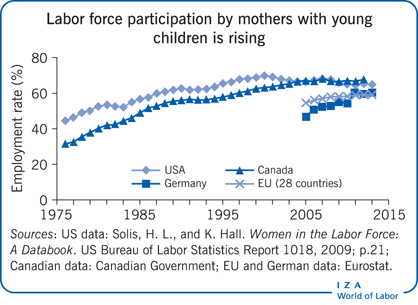Elevator pitch
Female labor market participation rates have increased substantially in many countries over the last decades, especially those of mothers with young children. This trend has triggered an intense debate about its implications for children’s well-being and long-term educational outcomes. The overall effect of maternal and paternal employment on children’s cognitive and educational attainment is not obvious: on the one hand, children may benefit from higher levels of family income, on the other hand, parental employment reduces the amount of time parents spend with their children.

Key findings
Pros
Most studies do not find any effect on a child’s short-term or long-term educational attainment from maternal employment.
Fathers’ working behavior does not seem to affect children’s long-term educational attainment.
The quantity of time that parents spend with their children is not decisive for children’s cognitive development or educational attainment.
High-quality time matters, and the amount of high-quality time is barely affected by parental employment.
Cons
Maternal employment during a child’s first year, especially during the first months, might be detrimental to a child’s cognitive development.
Children of highly educated parents may benefit from extended parental leave, while children of less educated parents may even suffer, educationally.
Evidence on the impact of work-related income on a child’s educational attainment is mixed.
Estimates of the effect of parental employment on children’s educational attainment are somewhat conflicting.
The effect of parental employment on children’s educational attainment depends on the quality of non-parental childcare.